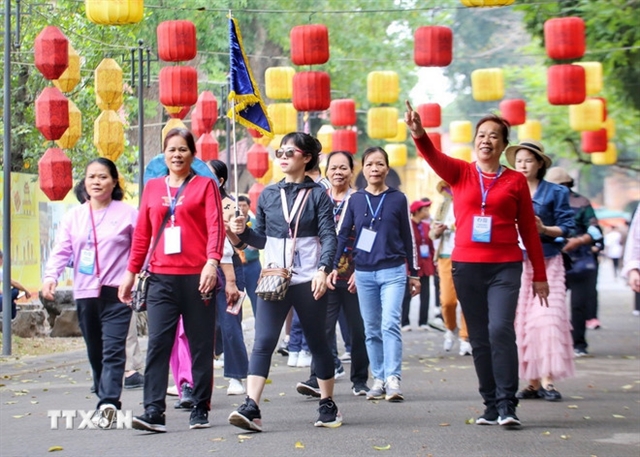 Society
Society


|
| Chinese tourists visiting Hà Nôi's Thang Long Citadel. VNA/VNS Photo |
HÀ NỘI – Việt Nam’s passports have recently increased by seven places and now rank 84th out of 199 countries and territories in the Henley Passport Index for the third quarter of 2025.
In the past 20 years, the Vietnamese passport has never surpassed 78th place or fallen below 94th place. The current 84th place is considered average but shows a positive upward trend.
This is a positive sign reflecting the international community's level of trust in Việt Nam - a stable country with growth potential and aspiration for integration.
'Soft indicator'
The passport advancement opens great opportunities for both Việt Nam’s tourism to further approach the international market and Vietnamese citizens to integrate globally.
With 51 destinations that allow Vietnamese people to enter without a traditional visa, the Vietnamese passport is currently on par with that of some other developing countries and ranks in the low-middle position on global rankings.
The significant increase in rankings in a short period is a remarkable signal, indicating that the Vietnamese passport is gradually moving up from the last group, thereby expanding travel opportunities for citizens in the context of increasingly deep international integration.
In recent years, Việt Nam has made significant progress in the areas of bilateral diplomacy, transparent governance, and public trust, from strengthening border security cooperation and improving electronic passports to accelerating bilateral visa exemption negotiations with countries in Asia, Africa, and the South Pacific.
The ranking of a passport is one of the tools that reflects the degree of freedom of movement for a country’s citizens.
In practice, passport rankings not only reflect the number of visa-free destinations but also serve as a 'soft indicator' of international trust, political stability, administrative capacity and the credibility of a country’s citizens when travelling abroad.
Opportunities
According to the General Statistics Office, in the first half of this year, the number of Vietnamese travelling abroad surpassed four million, a 53.9 per cent increase compared to the same period in 2024.
Turnover of service exports is estimated to reach nearly US$14.8 billion, of which tourism service is $7.63 billion, accounting for 51.5 per cent and increasing by 24.7 per cent compared to last year.
Đào Thị Kim Lan from Royal Tour Company said that visa waivers allow Vietnamese travellers to go abroad more easily without facing visa barriers, stimulating outbound travel demand.
“Domestic tour operators can also develop more products and services for Vietnamese travellers going overseas, thereby supporting the growth of the national tourism industry,” said Lan.
To improve competitiveness and raise the passport’s ranking globally, Hoàng Nhân Chính, head of the Secretariat of the Việt Nam Tourism Advisory Board (TAB), said that Việt Nam should accelerate negotiations and sign more visa waiver agreements, particularly with strategic partners such as ASEAN, the EU, and other developed countries.
At the same time, Vietnamese travellers should maintain a good image abroad, as every citizen represents the nation, Chính said.
“Travellers should respect local customs and cultural norms, show understanding and appreciation for local traditions. Doing so will earn Vietnamese tourists more respect overseas,” he said.
Meanwhile, Vũ Văn Tuyên, general director of Travelogy Việt Nam, said that passport rankings are not only the result of diplomatic efforts but also reflect how Vietnamese citizens are perceived globally.
According to the general director, any violation of foreign laws, illegal residence, or use of forged documents abroad may hinder bilateral visa negotiations.
“Việt Nam is currently improving administrative efficiency, modernising passport issuance and entry-exit management. With the rollout of e-passports with embedded chips, Việt Nam is catching up with international standards and enhancing document security,” Tuyên said.
“These advancements will boost partner nations’ confidence in the authenticity and transparency of Việt Nam’s documentation system.
“With these efforts and future potential, improving the Vietnamese passport’s ranking is not just symbolic - it directly impacts the lives and opportunities of millions of people,” he said.
“This includes students wishing to study abroad, entrepreneurs attending international expos, workers seeking legal employment overseas, or tourists eager to explore the world. The passport is a crucial key for Vietnamese people to access the world, not only as tourists, but also as ambassadors of culture, education, commerce and hospitality.”
For the tourism sector, especially outbound tourism, a higher passport ranking translates to wider access to global travel markets.
Vietnamese travellers will find it easier to obtain visas and enjoy favourable visa policies, especially in developed destinations like the EU, South Korea, Japan and Australia.
A transparent e-passport and administrative data system provides a strong foundation for tour operators to build premium, specialised packages aimed at high-income travellers seeking all-inclusive experiences—such as 'MICE tourism', 'wellness tourism' or 'luxury pilgrimage tours' to regions like Europe, Australia and North America.
This creates a strong impetus for travel businesses to expand outbound products and raise Việt Nam’s competitiveness on the regional and global tourism map. VNS




